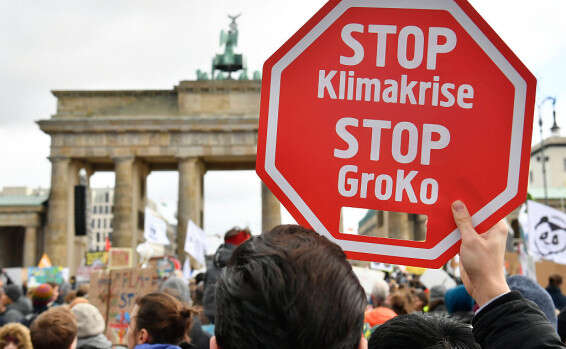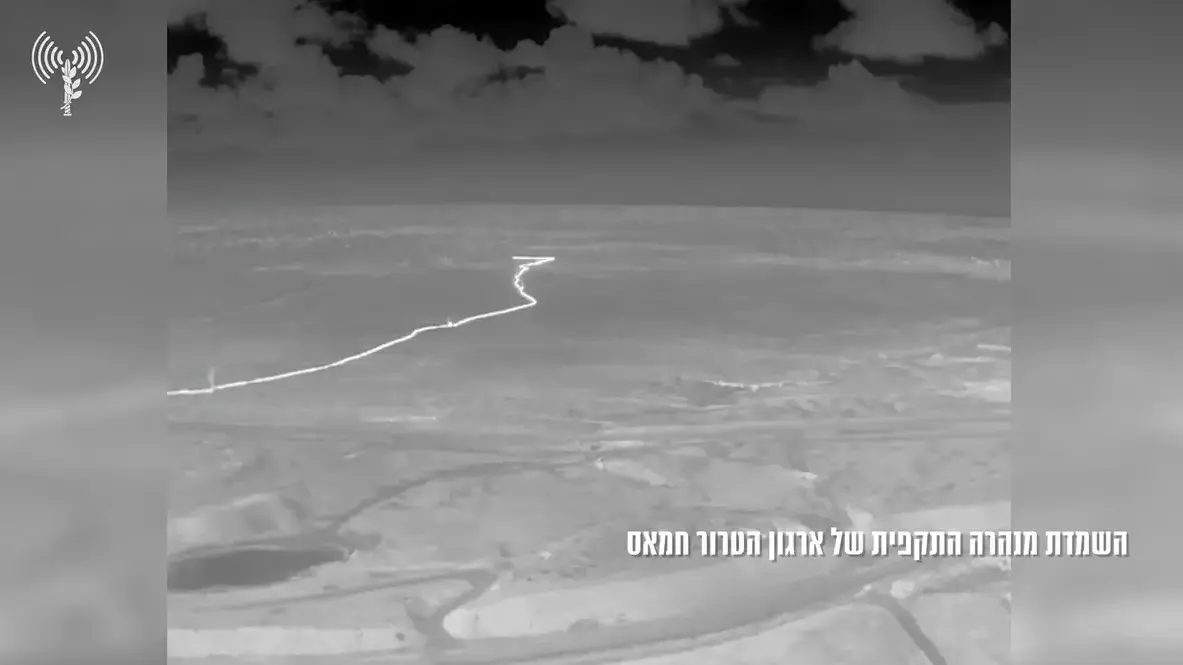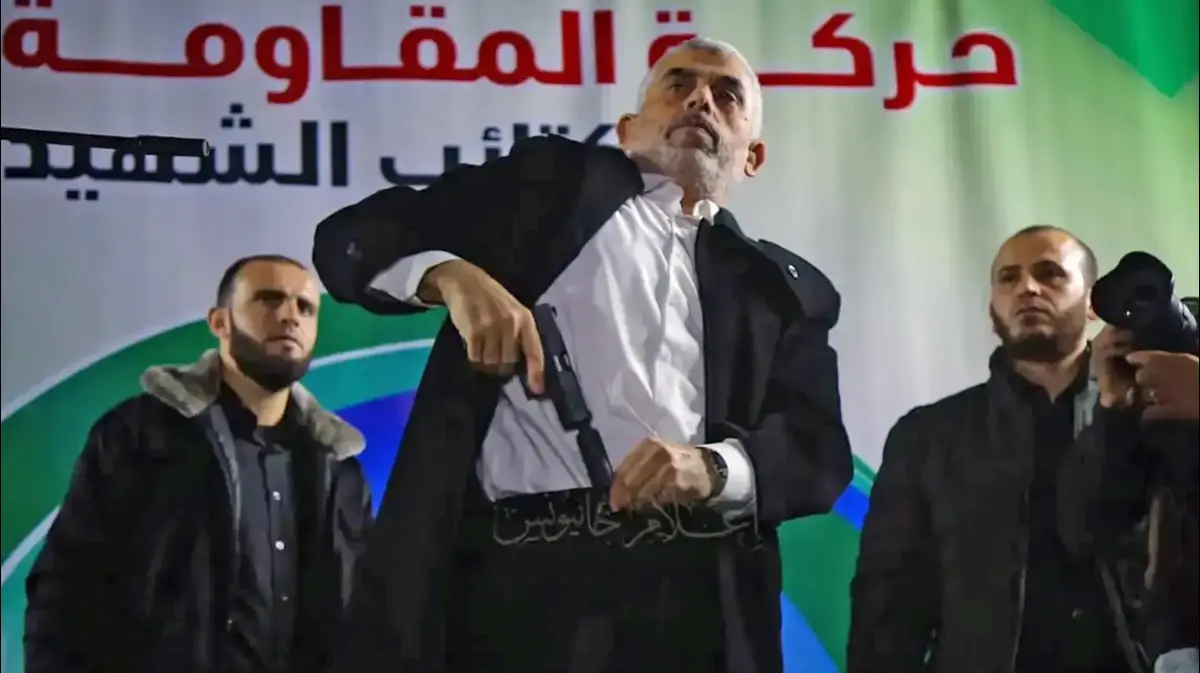The second decade of the century is not without events of violence and jolt, but also those that give hope for change • Between the European immigration crisis and the Me Too and Daesh movement, the last ten years have changed the world • Editors of Israel Today website chose the phenomena that made the decade
Berlin climate crisis demonstration // Photo: AP
Mankind has been a busy decade for humanity from 2010-2020. Wars, terrorist organizations, protest movements and, above all, the question asked which world is lurking for those who come after us. Israel's lawyers today chose the phenomena that made it past decade.
The climate crisis
Asaf Golan
To properly discuss the crisis or climate change that is happening on Earth, you should start with the following figure: All the warmest years ever measured by Earth's climate science are in the second decade of the 21st century. The record is 2016 that 8 out of the 12 months in which the record-breaking heat records so far worldwide have been broken.
• What a decade we had! Go to the special "Summary of the Decade" page
• Disagree with our choices? Come pick your people and decade's events
• Think you know everything that happened in the last decade? Enter the huge decade quiz
At the same time, the rate of thawing glaciers across the globe: in the Alps, Greenland, the North Sea and Antarctica, has accelerated as the main impact expected for this mass is on the sea, a rise that has already been felt over the past decade, causing flooding and population risk of islands that are very close to sea level .
In this context, if at the beginning of the decade there was still some resistance in the scientific world to the connection between man and the effect of the greenhouse and global warming, it is now concluded by an absolute majority and across camps in the scientific world that humanity does affect the earth and that actions aimed at dramatically reducing carbon dioxide emissions should be taken. Emitted into the atmosphere to stop the gradual escalation of heat and cold waves and other extreme natural phenomena in the world. At the same time, global warming has a proven impact on the environment in which hundreds of millions live, with flooding, desertification, loss of water sources, an increase in population migration, and regional wars such as those occurring in the Middle East.
More on:
International Climate Conference: Despite ambitions, environmental agreements suffer from a lack of enforcement
Report: Global warming will create chaos in the world by 2030
Climate science has become a church
Waste from Israel will become products at McDonald's
However, if the scientific work has come together in the last decade towards absolute certainty about the impact of man on the planet, then it is a matter of global humanity not meeting the goals it set for itself and many countries, including the US withdrew from the Paris Agreement signed in 2015 and signed in 2016 by most countries of the world. Decrease the carbon dioxide emissions rate to the atmosphere.
Protesting environmentalists in India // Photo: Reuters
The US exit and non-compliance by many other countries around the world have created a situation that at the end of the decade, humanity's damage to the environment seems to continue in full force and the global activities of the green organizations on this issue are not achieving its target. In other words, at the beginning of the third decade of the 21st century, the process of climate change passing through the earth seems to have crossed or is approaching the crossing point. This means that future generations will be hotter and colder on Earth, some parts of it will be flooded and others unworthy of settlement. This is of course without a dramatic change in the conduct of world countries, a change that currently seems far from over.
The Me too movement
Quiche light
In 2017, the world consciousness movement broke out with the tweet of American actress Alyssa Milano urging women to share in every possible way the sexual harassment they experienced and thus the affair exploded. But many of us do not know that the MeToo movement was founded in 2006, to give both men and women the feeling that they are not alone.
If we have to put our finger on the "no return" point of all the movement, those will of course be the accusations against Hollywood producer Harvey Weinstein, which rolled out until his arrest and trial for the next few months.
Over the three years since that Milan post, many celebrity and celebrity names have been added to one side or blamed the difficult experiences they have had. But we should not discuss the lives of the famous, because the effect of the protest also affects our own lives, of the "ordinary" people.
Related:
Weinstein List: Over 100 Complainants Against the Producer
Weinstein surrendered himself to the New York Police Department
Karma in Action: Harvey Weinstein's Empire was acquired by a group of women
New lawsuit: "Harvey Weinstein sexually assaulted 16-year-old"
More and more women and men have stopped being embarrassed and admitted to social networking and television interviews about past cases, calling to come out and complain against those who hurt or hurt them.
We also felt the impact of the movement here in Israel, when quite a few people released what they experienced and we continue to hear to this day about the increase in complaints filed for rape or sexual harassment. Suddenly governments, jobs and schools could no longer ignore stories, and in addition passed laws and monitors responsible for dealing with harassment cases.
Demonstration of ME TOO movement in the United States // Photo: IP
But of course, even in the case of MeToo, the criticism was not spared. Men began to grumble that "it is impossible to start with a girl right now," or "I am afraid of what they will put in my drink." We less often hear the term "she ordered it", or "she is bare dress so I couldn't stop myself".
These are fears that have always existed and thoughts that have always been in the air, but not in the awareness of the overall society.
It doesn't matter if it's been 10 minutes, 22 years or Jubilee, we're not alone. And this is the real revolution that the MeToo movement has instilled in human society, and completely changed the pages of history.
Migration to Europe
Eden Ronen
The crisis that began in 2015 has brought more than a million refugees and migrant workers to Europe from the Middle East and the Balkans, especially from Syria, Iraq and African countries. Thus, in the first and second decades of the 21st century, Europe eats the porridge that cooked for itself from the days of the colonial race in the late 19th century.
More on:
Twenty-nine fatalities in the sinking of an immigrant ship off Egypt's coast
UK truck disaster: 8 detainees in Vietnam
Italy has changed direction in access to asylum seekers
Italy: The Catholic Church will absorb Eritreans
Enthusiastic European powers exploited every good plot, overrun all who stood in their way, conquered vast territories, established colonies and left much destruction behind. Exploiting the wealth of ore and the cheap labor of manpower comes under the guise of a moral, educational and cultural contribution to the declining and inferior Third World countries. Europeans tell themselves that they exposed the "barbarians" to the Enlightenment and modernity, but in practice they uprooted local values, creating brutal crises and civil wars, even long after they left.
It is no wonder then that the destruction left by Europe caused the colonial natives to arrive decades after her. People without work, without language and without resources, from a completely different culture, visit the continent. The states were not prepared for their arrival, many were opposed to their acceptance, and many debates were created about the policies to be pursued and the economic burden they created.
Syrian immigrants in Hungary // Photo: Reuters
The biggest wave of immigration since World War II, which has indeed reached its peak, is still beating Europe. Its impact on the continent, culture and social fabric is slowly evident in the European landscape and will continue to grow slowly over the next decade. What is certain is that the immigrant boat refuses to leave the shore, and the waves are still shattering themselves.
The Arab Spring
Dawn Kleiman
The young men who became police officers of the Middle East: In the novel "The Jacobian House" by writer Alaa al-Aswani, the doorman's son in an old colonial building, is preparing for a fateful test. If he passed this test, he could become a police officer in Egypt in the future.
Unfortunately, Taha's rejection is well known in advance. He is not part of a circle close to the plate and at the end of the day - he will always be the goalie's son, with no horizon and meaningless life. Like his father, the important characters will pass by and if he is lucky they will say goodbye, maybe even throw in a little tip.
More on:
Four Things We Did Not Learn From "The Arab Spring"
Civil protest: The second round of the Arab Spring
It's the end of every spring (Arab)
Towards chaos in Lebanon? Nasrallah blames "foreign agents" for demonstrations
This is also how he learned about his meat, Mohammed Boazizi in Tunisia in late 2010. The jade was indignantly humiliated, and decided to set himself on fire. Who was a gambler in this total despair - he would buy his world.
What started with protests against the Sidi Buzzid municipality building - turned into an uprising against Zayn al-'Abdin Ali, who has ruled the country for a total of 23 years - ended with a shameless impeachment. The "Jasmine Revolution" spread to protests in Libya, Egypt, Yemen, Syria and other countries. The "Arab Spring" did not pass the reigns of Hosni Mubarak, Muammar Gaddafi and Ali Abdullah Saleh.
If we look at the preliminary results of spring, they are rather bleak. True, in some places the central tyrant was ousted, smuggled or brutally murdered. But what followed - there was no better reality. On the contrary, the rule of the Muslim Brotherhood in Egypt failed to address the state's problems and threatened to subordinate it to Sharia. The rebellion against the Assad regime ended in a bloodbath. Libya has entered a whirlwind of tribes, migrants and militias. And in Tunisia corruption remains in its form.
Protesters in Tahrir Square in Egypt // Photo: IP
But spring has not yet passed. Demonstrations that broke out in Sudan last year led to the ouster of tyrant Omar al-Bashir, and continued until the protesters were integrated into a joint interim government with the military. In Cairo, protests also broke out again after the Muslim Brotherhood had already been trampled. In Lebanon and Iraq, protesters are reading slogans against the absence of the economic horizon, corruption and the existing order. So even now, a decade into the "spring" events, it's too early to sum it up as a failure.
Either way, the "goalkeeper's sons" have earned at least one achievement. Unknowingly, they became the policemen of Arab leaders. A threat buzzing in the background of every conference room in the area. More and more rulers in Arab countries are turning to young people in society, trying to raise their confidence in their initiatives. They, too, know that despite fears of civil war and the rise of radical Islam - that was not what it would be.
ISS
Net bar
If in the field of global terrorism, the previous decade was the decade of Al Qaeda, the current decade certainly belongs to the rise and fall of ISIS's terrorist caliphate. The Islamic Terrorism Organization has taught the world episodes with the utmost vigorous restraint, boundless ambition and, surprisingly, even brand management.
The terrorist organization founded by Abu Bakr al-Baghdi in Iraq in 2012, after splitting from al-Qaeda, carried with it new characteristics. The members of the new terrorist organization sought to establish an Islamic caliphate instead of the disintegrating regimes in the Middle East before turning to the war in the West and its envoys. ISIS was able to exploit the Sunni bitterness against Iraqi rule, conquer large bastions in the country and then invade Syria with great force.
The result was the establishment of a terror empire at its peak that stretched from the suburbs of Damascus to the suburbs of Baghdad with millions of civilians under the strict Islamic rule of the organization. ISIS people did not content themselves with the conquests, they enacted laws, issued coins, documents and driver's licenses and governed the new "state" they established at their extreme whims.
Like other international terrorist organizations, ISIS drew thousands of foreign fighters to its territory, but unlike the previous Islamic terrorist organizations, many of the foreigners who came to serve the organization did not come to fight, but to live in the fulfillment of the strict self-serving vision.
More on:
Documentation: ISIS operatives were arrested at the airport
Roots of Evil: The Story of the Rise of ISIS and Abu Bakr al-Baghdadi
ISIS lost a major stronghold in eastern Afghanistan
Prepare for ISIS comeback
ISIS has set a whole new threshold in the ability to use the media as a means of terrorism and mobilization of support. ISIS has set up an online news agency, a monthly magazine and a complex set of recruitment agents on the Internet, all with unprecedented graphical professionalism. The organization has uploaded video after video of a gruesome and graphic record of the execution of its opponents.
ISIS personnel showcase Syrian prisoners in Tadmor // Photo: IP
The combination of a faithful propaganda apparatus and many Western countries supported the organization to carry out horrific attacks in France, the United Kingdom, the United States and Germany, from attacks that took the lives of hundreds of people. Hundreds of agricultural groups around the world, from the Philippines to Nigeria, have sworn allegiance to ISIS. Even after the empire that built ISIS in Syria and Iraq collapsed under the many enemies it created, ISIS's spirit continues to threaten the world.
Social networking
Lillian dialect
The networks that cut us off: At the beginning of the second decade of the 21st century, social networks seemed like a tool. That high school boyfriend, the love that went overseas, the Arab Spring, protests set in Facebook groups under the noses of tyrannical regimes, Twitter as a major media outlet for protests in Iran - social networks seemed to be a tool that boosts democratic leanings and gives voice to the silenced.
But then the current decade came and patted us. Social networks, as they grew, and primarily Facebook, became a tool for schism, lies, ignorance, and false information. Facebook and Wattsap have become the weapon of choice for governments in psychological warfare, using fake profiles, protest events that were never really designed to exist and, of course, as a voting bias and affecting the true voice of the people, this time for the worse. In some cases, spreading the rumors and escalating tensions also took human lives.
Notebook or Separator? Facebook // Photo: Gettyimage
The explosion of the Cambridge Analytica affair, a British company from psychological warfare backgrounds that used 800 million users' personal information in favor of Donald Trump's 2016 campaign, illustrates most how Facebook, founded to connect people, has become a party network between people, Seeds conflict and division within democratic societies and increases the rifts.
More on:
The rise of technology powers
Facebook: Update the Wetsap widget right away to avoid hacking
NSO Group employees are suing Facebook
Research: Social networks exhaust adolescents
Facebook has admitted that it has not done enough to stop it, in the name of the huge profits it has made from political ads on the network. Two years after the affair burst, Mark Zuckerberg still refuses to remove false political ads from his network, and the social future of democratic societies in the Western world, both online and outside, seems ever grim.
Pike News
Eden Ronen
Donald Trump's rise to the presidency has also led to the rise of the Peak News concept, which has not let us down since his election campaign. False news has always existed, but in the era of postmodernism or "post truth," they can be said to have received special attribution.
At a time when anyone can write and report from anywhere, and while the databases are never-ending, the spread of false news is inevitable. In the age of the fast Internet, we want to get news as quickly as possible, and this sometimes comes at the expense of the reliability of the information.
Social networks like Facebook and Twitter are a raging arena for distributing Pike News, especially in the political field but not only. Researchers have found that Pike News is spreading and spreading much faster than reliable news. It is also found that false political information tends to spread three times faster than false non-political information.
Coined the term, US President Donald Trump // Photo: Reuters
In general, our confidence in all the systems surrounding our lives is undermined. People less believe in publications, and more think of the hidden interest behind them.
More on:
How did we become Pike News ambassadors?
Facebook will mark Pike News
Visit to Bahrain: This is how I found myself in the Pike News affair
Pike News: The media does not learn from its mistakes
Trump regularly comes out against the media outlets in the United States, claiming that they are distributing "Pike News." But you can say that Pike News is being circulated on every issue all the time - we've just become much more aware of the issue.
The real problem is that awareness may be overstated, the truth already seems to us a lie. And precisely in such a situation, when the news of the truth is in doubt, the power of falsehood is greater.
The crisis in Ukraine
Uncle Becker
Ukraine has undergone a very turbulent decade and some of its dramatic events are accompanying it these days. This young post-Soviet state, which was the most important republic in the Red Empire and its "grain basket," is still struggling for its identity. Ukraine's lack of democratic tradition can to some extent explain all the upheavals it is experiencing. Since its inception, it has been confronted with a corruption problem, a difficult economic situation and a very complex geopolitical situation.
Ukraine is torn between East and West - meaning between Russia's traditional sphere of influence and the desire to absorb and assimilate in Europe, with emphasis on the EU and NATO. This was the backdrop to two revolutions: the "Orange Revolution" at the end of 2004 and the Euro-Maiden demonstrations at the end of 2013 - Early 2014. In both cases, the protesters demanded to move closer to Europe but the corrupt presidents (Kuchma and Vinokovic, respectively) did not really want to disengage from Moscow's navel.
Battles between Ukrainian army and pro-Russian rebels // Photo: Reuters
Protests in the Independence Square in Kiev soon deteriorated into violent clashes between the protesters and the security forces. The country has sunk into chaos that has prompted Crimea residents, the vast majority of whom are affiliated with Russia, to demand the intervention of the mother homeland. For the Russian bear, it was an hour of fitness to return land of historical and strategic importance.
More on:
Ukraine: Rebel leader killed in blast
Ukraine: Graffiti was sprayed on Jewish sites in Odessa
"Ukraine Declaration on Military Government - Exacerbating Tensions"
The recordings revealed the Russian connection to the overthrow of the Malaysian aircraft
In the first two weeks of March 2014, Putin sent his forces to the Crimea and took it almost unopposed. The new authorities in Kiev were too busy extinguishing fires across the state and could do nothing against the power of the great neighbor to the east.
At the same time, Duczank and Lugansk's provinces, also affiliated with Russia, tried to retire from Ukraine but encountered stubborn opposition, which has so far sustained some 13,000 civil war victims on both sides.
Ukraine's problems also did not go down with pro-Western President Petro Poroshenko who was disappointed and is currently suspected of corruption. His replacement, Volodymyr Zalansky, who took office in April of this year, was seen as a non-establishment candidate with his shoes clean. Much rests on the humble shoulders of the first Jewish President of Ukraine.
In the early months of his tenure, he succeeded in improving the economic and governmental situation, but for now he has no solution to the civil war. As if lacking trouble, he and his country "starred" in the Ukraine-Gate affair in which Trump got involved in giving financial aid to Kiev in exchange for opening an investigation against his Democrat rival Biden and his son allegedly linked to a corruption case in Ukraine. Zelansky doesn't even have a minute.
Antisemitism
Dan Lavie
From the time we were with his religion - there was anti-Semitism. Hence, absurdly different expressions of history, of its incarnation, are the "most natural" for us, the Jews, and its new clothes - the old ones of the last decade are nothing but a continuation of the hatred of ancient Jews.
Over the past decade, Muslim anti-Semitism has continued to be the most dominant and essential in the world (radical Islam - its contemporary expression is organizations such as al-Qaeda and ISIS; Radical and BDS organizations).
In general, there are many reports of rising anti-Semitism in Europe; Expressions of vandalism alongside violence and persecution of Jews are common in many European countries, although each has a very different national history regarding Nazism and the Holocaust. While fewer violent incidents (2014-2017) have been recorded, these have been converted to anti-Semitic activity on social networks and posed a challenge to tackle the phenomenon in another arena.
More on:
Ahead of the election: a recent effort to combat Labor anti-Semitism
Antisemitic attack in London: a major was beaten severely
Serious anti-Semitism towards Australian children
Muslim protecting Jews from anti-Semitism
In the US, white supremacists in the US are experiencing a kind of resurgence in the past three years, which is largely attributed to the rise of the alternative right.
Swastikas on Jewish graves in France // Photo: IP
At the same time, radical leftist movements - especially campuses in the United States - continued with fierce anti-Israeli propaganda that led to a sense of Jewish students' lack of freedom as expressed in pro-Israeli or Zionist views.
Last year (2018) a record number of Jewish murderers have been recorded in anti-Semitic attacks since Argentina (in the 1990s) against the Jewish community - 13 are murdered in three anti-Semitic attacks (11 of them in the Pittsburgh synagogue). Even in the current year, it is evident that a sense of "emergency" among Jews in various cities and countries, as regards their own security and their place in the society around them, is growing.
Towards the beginning of 2020, the expected question remains: What will be the nature of the (contemporary) Protocols of the Elders of Zion for the coming years?


/cloudfront-eu-central-1.images.arcpublishing.com/prisa/6YOQKRNM2VFEDJ77EV4BG7TTOQ.JPG)
/cloudfront-eu-central-1.images.arcpublishing.com/prisa/EMYXC3EVHNEG3OJHGIQCB2IVYA.jpg)
/cloudfront-eu-central-1.images.arcpublishing.com/prisa/VOQEHFVTC5OSYTU5YOO5SYQ5DU.jpg)




